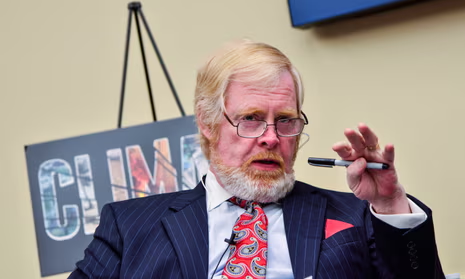Donald Trump’s nomination of conservative media activist Leo Brent Bozell III as US ambassador to South Africa signals a deepening rift between the two nations. Bozell, founder of the right-wing Media Research Center, is a staunch pro-Israel figure known for his efforts to challenge what he claims is liberal media bias. His appointment comes at a time when US-South Africa relations are at a historic low, driven by diplomatic expulsions, economic sanctions, and sharp disagreements over racial policies and international conflicts.
A Controversial Nomination
Bozell’s nomination, pending Republican-controlled Senate confirmation, is already stirring debate. His ideological leanings and deep ties to conservative media raise concerns about how he will engage with a South African administration increasingly at odds with Washington.
Adding to the controversy, his son, Leo Brent Bozell IV, was convicted for his role in the January 6 Capitol riots and later received a presidential pardon from Trump. This familial connection underscores the ideological motivations behind the appointment and raises questions about the politicization of diplomatic roles under Trump’s leadership.
US-South Africa Relations: A Rapid Decline
The diplomatic relationship between the US and South Africa has deteriorated significantly under Trump’s presidency. In early March 2025, Trump expelled South Africa’s ambassador to Washington, Ebrahim Rasool, after US Secretary of State Marco Rubio accused him of being a “race-baiting politician who hates America.”
This move followed South Africa’s ongoing genocide case against Israel at the International Court of Justice (ICJ), a case that enraged Washington and Tel Aviv. Trump has repeatedly condemned South Africa’s legal challenge to Israel, and Bozell’s nomination can be seen as a direct response to Pretoria’s stance on the Gaza conflict.
Economic Retaliation: Cutting US Aid to South Africa
Beyond diplomatic hostilities, Trump has taken punitive economic measures, signing an executive order in February 2025 that cut US aid to South Africa, citing alleged discrimination against the country’s white Afrikaner minority. The executive order also included a refugee resettlement program for Afrikaners, an unprecedented move that has been widely criticized as a misrepresentation of South Africa’s land and racial policies.
The land expropriation law passed by South Africa in January 2025, allowing for land redistribution without compensation in specific cases, was a key trigger for Trump’s decision. However, the South African government has pointed out that the US has similar laws enabling the state to acquire land for public use. The framing of the issue as racial persecution of white farmers has been heavily pushed by far-right groups close to Trump, despite evidence showing that land and economic power remain overwhelmingly concentrated among South Africa’s white minority.
Israel, the ICJ Case, and Bozell’s Role
Bozell’s strong pro-Israel stance aligns with Trump’s increasingly aggressive foreign policy against countries critical of Israel. South Africa’s genocide case at the ICJ—one of the most significant legal actions against Israel—has widened the gulf between the two nations.
Israel, which has been ordered by the ICJ to take measures to prevent potential acts of genocide in Gaza, has been vocally supported by Trump. By appointing Bozell, Trump is not just signaling his unwavering support for Israel but is also openly punishing South Africa for its international stance.
The Musk Factor: A Backdoor for Diplomacy?
Some analysts believe that despite Trump’s hostile posture toward South Africa, economic interests—particularly those of Elon Musk—could create avenues for dialogue. Musk, a South African-born billionaire, has been openly critical of South Africa’s policies, particularly its telecom equity requirements that mandate foreign investors cede 30% of equity to Black ownership.
Musk has echoed Trump’s claims of a so-called white genocide in South Africa, a term widely discredited by experts but frequently pushed by far-right groups. His statements, including opposition to South Africa’s economic empowerment laws, align closely with Trump’s foreign policy rhetoric. Some analysts argue that Pretoria could leverage Musk’s interests in Starlink and tech expansion to ease tensions without compromising sovereignty.
What Lies Ahead?
With Bozell’s confirmation likely, South Africa must prepare for an ambassador who embodies Trump’s most hardline positions on media, race, and Israel. His appointment is not just a personnel change—it symbolizes a deliberate shift in US-South Africa relations, rooted in Trump’s ideological battles rather than pragmatic diplomacy.
South Africa’s historical success in navigating complex global diplomacy, particularly in ending apartheid, offers a blueprint for weathering these challenges. However, as Trump redefines US foreign policy along hyper-partisan lines, Pretoria will have to rethink its approach to managing one of its most volatile international relationships in recent history.
The question remains: Will economic pragmatism override political hostilities, or are US-South Africa relations heading for a prolonged freeze under Trump’s presidency?
Related stories:
Ireland Supports South Africa’s ICJ Case Against Israel
ICJ to Rule on South Africa’s Plea Against Israel on 23May
Egypt Joins South Africa’s Genocide Case Against Israel
Top UN Court Rejects South Africa’s Request for More Gaza Measures: What It Means for the Region
South Africa Knocks ICJ Door: Demanding Suspension of Genocide in Gaza
















